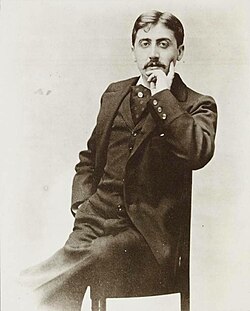Marcel Proust Quote
Among all the methods by which love is brought into being, among all the agents which disseminate that blessed bane, there are few so efficacious as the great gust of agitation which, now and then, sweeps over the human spirit. For then the creature in whose company we are seeking amusement at the moment, her lot is cast, her fate and ours decided, that is the creature whom we shall henceforward love. It is not necessary that she should have pleased us, up till then, any more, or even as much as others. All that is necessary is that our taste for her should become exclusive. And that condition is fulfilled so soon as - in the moment when she has failed to meet us - for the pleasure which we were on the point of enjoying in her charming company is abruptly substituted an anxious torturing desire, whose object is the creature herself, an irrational, absurd desire, which the laws of civilised society make it impossible to satisfy and difficult to assuage - the insensate, agonising desire to possess her.
Among all the methods by which love is brought into being, among all the agents which disseminate that blessed bane, there are few so efficacious as the great gust of agitation which, now and then, sweeps over the human spirit. For then the creature in whose company we are seeking amusement at the moment, her lot is cast, her fate and ours decided, that is the creature whom we shall henceforward love. It is not necessary that she should have pleased us, up till then, any more, or even as much as others. All that is necessary is that our taste for her should become exclusive. And that condition is fulfilled so soon as - in the moment when she has failed to meet us - for the pleasure which we were on the point of enjoying in her charming company is abruptly substituted an anxious torturing desire, whose object is the creature herself, an irrational, absurd desire, which the laws of civilised society make it impossible to satisfy and difficult to assuage - the insensate, agonising desire to possess her.
Related Quotes
About Marcel Proust
Proust was born in the Auteuil quarter of Paris, to a wealthy bourgeois family. His father, Adrien Proust, was a prominent pathologist and epidemiologist who studied cholera. His mother, Jeanne Clémence Weil, was from a prosperous Jewish family. Proust was raised in his father's Catholic faith, though he later became an atheist. From a young age, he struggled with severe asthma attacks which caused him to have a disrupted education. As a young man, Proust cultivated interests in literature and writing while moving in elite Parisian high society salons frequented by aristocrats and the upper bourgeoisie. These social connections provided inspiration and material for his later novel. His first works, including the collection of stories Les plaisirs et les jours, were published in the 1890s to little public success.
In 1908, Proust began work on À la recherche du temps perdu. The novel consists of seven volumes totaling around 1.25 million words and featuring 2,000 characters. It explores themes of memory, art, love, High Society and the human experience through the narrator's recollections. Begun when Proust was 38, the novel was partially published in his lifetime, with the initial sections appearing in 1913. The remaining volumes were revised and published posthumously by his brother Robert based on drafts and proofs. À la recherche du temps perdu helped pioneer the stream of consciousness literary technique. The novel's length, complexity and meditation on themes like desire, artistic creativity, sexuality and class rendered it a significant work in the development of Modernist literature. The work was translated into English by C. K. Scott Moncrieff and others.
Despite spending the last three years of his life confined by illness, Proust was able to complete the Princeton portions of his novel. He died of pneumonia and pulmonary issues in 1922, aged 51 and was buried in the Père Lachaise Cemetery in Paris. Proust's sexuality and relationships with men were an open secret among his social circles, though the author himself never publicly acknowledged being homosexual.
